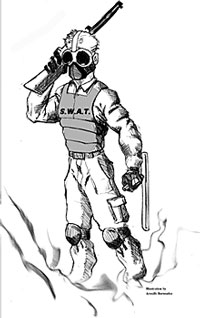
Illustration by Arnulfo Bermudez
|
By Phil Leckman
Arizona Daily Wildcat
Monday March 31, 2003
It wasn't a large protest, not even by Albuquerque standards ÷ by any estimate, fewer than 600 demonstrators were in attendance. And while some tempers in the impromptu crowd ran high ÷ the United States had just launched its attack on Iraq ÷ it is unlikely that many of those present expected that the March 20th gathering outside the University of New Mexico bookstore would end in violence.
But as the crowd attempted to march toward downtown Albuquerque, they were met by more than a hundred heavily armed police officers. When the marchers refused orders to leave the streets, the police responded by firing tear gas and pepper balls, then wading into the scattering protesters with batons at the ready.
The diverse Albuquerque crowd included families, children and the elderly ÷ hardly a group warranting a violent police response. But that's exactly what they got. According to the Albuquerque Journal, one elderly woman was following police orders to step back when an officer struck her five times with a baton. Another protester, a UNM doctor, was suffering a tear gas-induced asthma attack when police knocked him to the ground and arrested him for inciting a riot.
Even against such a chaotic backdrop, the spectacle of police bludgeoning elderly women and asthmatic doctors is frightening. While some display of force may be acceptable if a crowd threatens to injure others or destroy public property, the behavior of Albuquerque cops towards members of a generally peaceful group seems way out of line.
But what's even more disturbing than the violence itself ÷ and what warrants additional attention ÷ is the contemptuous attitude these events betray towards American citizens exercising one of their fundamental rights. In Albuquerque, this contempt was scarcely concealed ÷ one bystander even said he witnessed a police officer laughing as he prepared to fire tear gas into the crowd.
Unfortunately, attitudes like these are far from unique. In the year and a half since Sep. 11th, civil liberties watchdogs have documented dozens of violations of the freedoms of those who dare to publicly oppose the policies of the Bush administration.
As reported last week on the Democracy Now! radio program, this assault on our fundamental liberties has only worsened since the beginnings of protest against war in Iraq. Across the U.S. ÷ including right here in Tucson ÷ state and local governments are taking aim on the basic constitutional right of assembly itself.
In Oregon, for instance, a recently proposed piece of legislation would create a new crime of "terrorism," defined so broadly that those engaged in a protest or strike could face penalties up to and including life in prison. Tucson's proposed ordinance, while not quite so draconian, also seems designed to squelch freedom of assembly.
According to the proposed rules, demonstration organizers would have to obtain a police permit 60 days in advance, greatly limiting the possibility of spontaneous protest. Organizers would also be forced to pay for police presence and any other civic costs the event incurred. Further, the power to approve or deny a proposed demonstration would rest solely in the hands of the chief of police. Protests during rush hours ÷ like the demonstration that occurred in downtown Tucson at virtually the same time as the Albuquerque gathering ÷ would be summarily prohibited.
Although the proposed regulation changes were scheduled for a vote last week, the City Council, sensing controversy, perhaps, has thus far postponed a decision. Here's hoping that reason prevails and the regulation changes are rejected. Tucson's attack on the right to organized dissent ÷ like attacks on dissent around the nation ÷ is a dangerous encroachment on one of the foundations of our republic. The unrestricted right to public protest ÷ whether or not we agree with the views of the protesters ÷ is a fundamental facet of American democracy.
Ever since the war began, Americans from all sides of the political spectrum have called on us to "support the troops." It is by their force of arms, we're told, that our democracy is preserved. That argument may seem shaky in light of the current struggle, a war of aggression where the role of economics or the nation's military ego are far more obvious than any threat to American representative government.
But even those who accept this logic must acknowledge that supporting those who oppose the war at home is even more important. Those who voice anti-war or anti-government thoughts are often accused of being un-American.
In truth, however, it is difficult to imagine what is more American than dissent. Much more than troops abroad, those who freely speak their minds at home are preserving the values that make this country worth fighting for.

